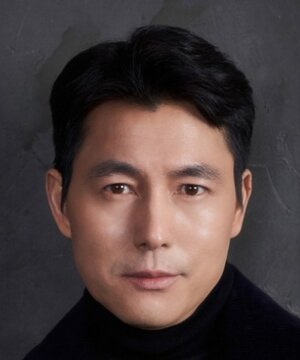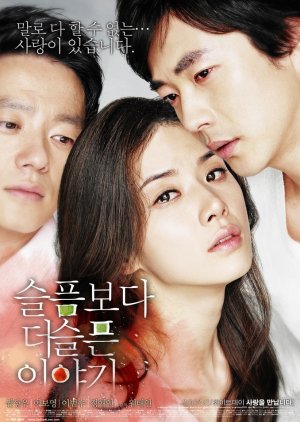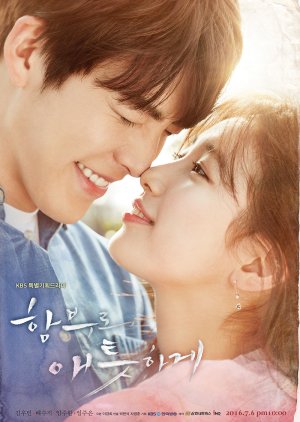REVIEW: Why “A Moment to Remember” Is the Most Heartbreaking Korean Film You’ll Never Forget
Film: A Moment to Remember
Native Title: 내 머리속의 지우개 (Nae Meorisogui Jiugae)
Also Known As: An Eraser in My Head
Screenwriter & Director: John H. Lee
Screenwriter: Kim Young-ha
Release: 2004
Duration: 117 min (Director’s Cut: 144 min)
Genre: romance, melodrama, drama
Tags: tearjerker, illness, amnesia
Cast
Main Role

Son Ye-jin as Kim Su-jin

Jung Woo-sung as Choi Chul-soo
Support Role




A Heart-Wrenching Tale of Love and Loss
Overview
A Moment to Remember holds a unique place in my heart—not only as a cinematic achievement, but as a deeply personal experience. It was the first Korean film I ever watched, over fourteen years ago, and revisiting it now after all this time was nothing short of an emotionally overwhelming experience. The story hit just as hard—if not harder—as it did back then.
This isn’t just a cinematic revisit; it’s a rediscovery of a story so human, believable, and emotionally raw that it feels almost impossible to sit through. Not because it’s poorly made or slow—far from it—but because the final twenty minutes are nearly unbearable. I watched them with a tightened throat and tears streaming down my face.
Released in 2004 and directed by John H. Lee, A Moment to Remember is a South Korean romantic drama that has left an indelible mark on audiences worldwide. Adapted from the 2001 Japanese television drama Pure Soul, the film masterfully blends romance and tragedy, exploring the fragility of human memory and the enduring power of love.
Starring Son Ye-jin and Jung Woo-sung, it tells a deeply emotional story of love, marriage, and the devastating impact of early-onset Alzheimer’s disease. With its heartfelt performances, beautiful cinematography, and soul-stirring themes, A Moment to Remember remains one of the most beloved and heartbreaking romance films in Korean cinema.
Plot Summary
Kim Su-jin (Son Ye-jin), a bright and warmhearted fashion designer, encounters Choi Chul-soo (Jung Woo-sung), a quiet, hard-working carpenter with dreams of becoming an architect. What begins with awkward tension and subtle attraction soon blossoms into a tender, genuine romance that leads to marriage.
However, their idyllic love story takes a heartbreaking turn when Su-jin is diagnosed with early-onset Alzheimer’s disease. As her memories begin to fade, Chul-soo is faced with the painful reality of watching the love of his life disappear before his eyes. The film follows his unwavering devotion as he cares for Su-jin, illustrating the profound depth of true love.
Performance & Characterization
Son Ye-jin as Kim Su-jin
Let me say this without hesitation: Son Ye-jin is my favorite actress, and her performance here is a major reason why. She is phenomenal in every role, but in A Moment to Remember, she reaches another level. From her playful charm to her quiet devastation, she captures every nuance of Su-jin’s emotional and cognitive descent. Her portrayal is so authentic, delicate, and human that it feels less like acting and more like watching someone’s life unravel in real time.
Jung Woo-sung as Choi Chul-soo
As her counterpart, Jung Woo-sung delivers a quietly stunning performance. Chul-soo is a man of few words, but his eyes speak volumes. His transformation from gruff loner to gentle caregiver is performed with subtle grace, showing the kind of love that doesn’t need declarations—it proves itself through action and sacrifice.
Their chemistry is understated yet authentic, built on small gestures and unspoken understanding. It is precisely the lack of melodramatic fireworks that makes their connection so believable—and so heartrending.
Direction & Cinematography
John H. Lee’s Direction
John H. Lee directs with remarkable restraint, choosing stillness over spectacle. He builds emotional depth through quiet, intimate scenes that allow the characters’ internal worlds to come through. He’s not trying to manipulate tears—he earns them.
Visual Style
Cinematographer Lee Jun-gyu beautifully mirrors the film’s emotional journey through evolving visual tones. The early romance is captured in soft, warm light, evoking intimacy and nostalgic comfort. As Su-jin’s memory fades, the visuals shift—cooler hues, starker lighting, and isolating compositions take over, reflecting her mental state and Chul-soo’s growing loneliness.
Through careful use of doorways, corridors, windows, and shadows, the cinematography subtly emphasizes the themes of fading identity and emotional isolation, making the characters’ internal struggles visibly, almost painfully real.
Music & Sound
Kim Tae-won’s gentle, melancholic score serves as a quiet pulse beneath the film’s emotional landscape, perfectly complementing its sorrowful yet beautiful narrative. The soft piano melodies and occasional classical pieces rise and fall with the emotional rhythm of the story—never overpowering, always enhancing.
The music becomes the language when the characters can no longer find the words. It is the kind of music that echoes in your mind long after the film ends—an invisible thread tying emotion to memory, just like the story itself.
Themes
Memory and Identity
The film raises profound questions about memory and identity. As Su-jin loses her memories, she also loses her sense of self. This tragedy highlights the fragile nature of human identity and how deeply our memories define who we are. The heartbreaking irony is that even as Su-jin forgets, Chul-soo remembers everything, making his suffering all the more poignant.
Devotion Beyond Recognition
At its core, A Moment to Remember is about unconditional love and the power of devotion. Chul-soo’s unwavering commitment to Su-jin, even as she forgets him, is a testament to true love in its purest form. His willingness to care for her despite the pain of being forgotten showcases the depth of their bond.
Tragedy and Acceptance
Unlike many romance films, A Moment to Remember does not shy away from the harsh realities of life. It portrays Alzheimer’s with sensitivity and realism, showing both the psychological and emotional toll it takes on the patient and their loved ones. The film’s ending, though devastating, is also beautiful in its quiet acceptance of fate.
When a memory is gone, so is the soul, they say.
Reception and Legacy
Upon its release on November 5, 2004, A Moment to Remember became an instant success in South Korea, topping the box office for two consecutive weeks and finishing as the 5th highest-grossing film of the year with over 2.5 million admissions. Its emotional resonance quickly crossed borders; in Japan, it broke previous records for Korean films, becoming the 19th highest-grossing film at the Japanese box office in 2005.1
The film’s critical success was equally significant. Director John H. Lee and writer Kim Young-ha were awarded Best Adapted Screenplay at the prestigious 2005 Grand Bell Awards, honoring their sensitive and powerful reimagining of the Japanese television drama Pure Soul.2
Over the years, A Moment to Remember has only grown in stature. It remains a timeless classic, a touchstone for anyone moved by heartfelt, tragic romances. Its influence endures, inspiring countless films and dramas that explore the fragility of memory, the quiet bravery of enduring love, and the unbreakable bond between heart and identity. Even today, it continues to find new audiences, reaffirming its place as one of the most beloved and emotionally resonant works in Korean cinema.
Personal Reflection
Watching A Moment to Remember again after so many years was like opening an old letter in your own handwriting—intimate, bittersweet, and painfully familiar. I remembered how it made me feel the first time, and it didn’t just meet those memories—it deepened them. The emotional weight is even more profound now, as if the film aged with me and chose the perfect moment to remind me of everything it once stirred.
This isn’t just a film—it’s an emotionally charged rollercoaster, a sentimental abyss, an emotional hell of the most beautiful kind. And yes: tissues are non-negotiable.
There are films you simply watch, and then there are those that leave you altered. This is the latter. It left me emotionally undone, breathless from the quiet devastation it so effortlessly delivers.
You might call it emotional manipulation—and perhaps you’d be right. But you know what? I don’t care. Not one bit. Because even the coldest heart, the most cynical viewer, couldn’t deny the flood of indescribably painful and beautiful emotion this film evokes.
And one more thing—no line has ever felt so desperately anticipated as this one:
“사랑 해요” — “I love you.”
When it finally comes, it doesn’t just land. It shatters you.
Final Thoughts
A Moment to Remember is not just a film about Alzheimer’s, nor merely a tragic love story—it is a crushingly beautiful meditation on time, memory, and the quiet bravery of enduring love. With its restrained storytelling, emotional depth, and profound sincerity, it stands as a monument to the enduring power of love, even as time, illness, and forgetting threaten to take everything else away.
Few films manage to evoke such raw and lasting emotion. A Moment to Remember is not simply a tearjerker; it is a film that stays with you long after the credits roll, its heartbreak and tenderness echoing quietly in the heart. Its depiction of Alzheimer’s, paired with one of the most beautifully tragic love stories ever committed to screen, makes it an unforgettable landmark of Korean cinema.
Yes, it’s devastating. Yes, it will wreck you. But it will also remind you—achingly, powerfully—what it truly means to love someone. For newcomers to Korean cinema, this is essential viewing. For those revisiting it after years, its emotional resonance may strike even deeper, transforming it from a film you watch into a memory you carry.
A Moment to Remember is a deeply emotional, believable, and unforgettable cinematic treasure—one that pierces the heart and stays there, like the lingering note of a sad song long after it ends. It’s not just a film; it’s a quiet emotional echo that follows you beyond the credits. Watch it with your heart open, your soul braced, and your tissues close at hand. Prepare to remember—forever.

Trailer
Recommendations
1,2 “A Moment to Remember,” Wikipedia, https://en.wikipedia.org/wiki/A_Moment_to_Remember
Disclaimer: All images are owned by their respective creators. Used here under fair use for review purposes.



























